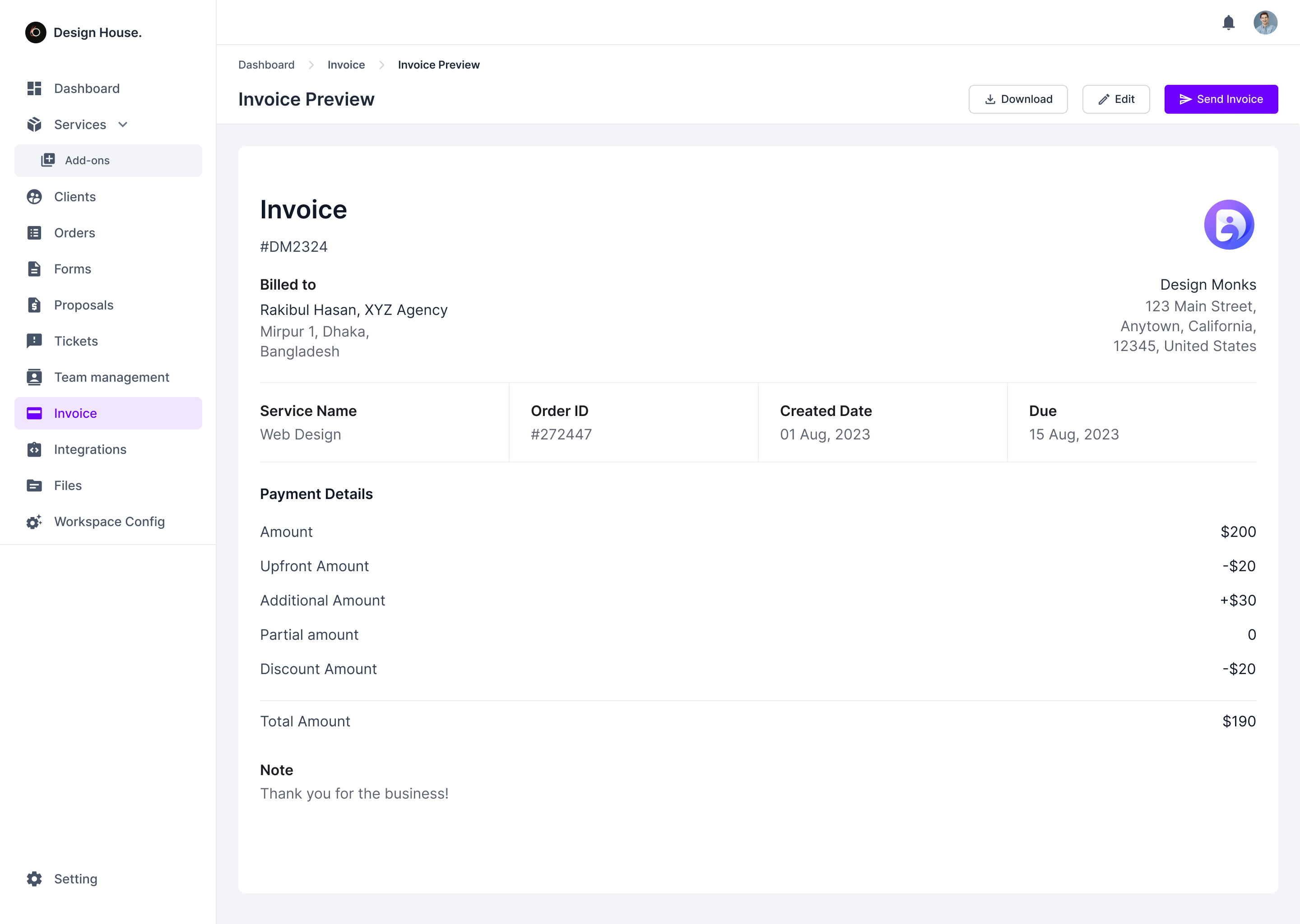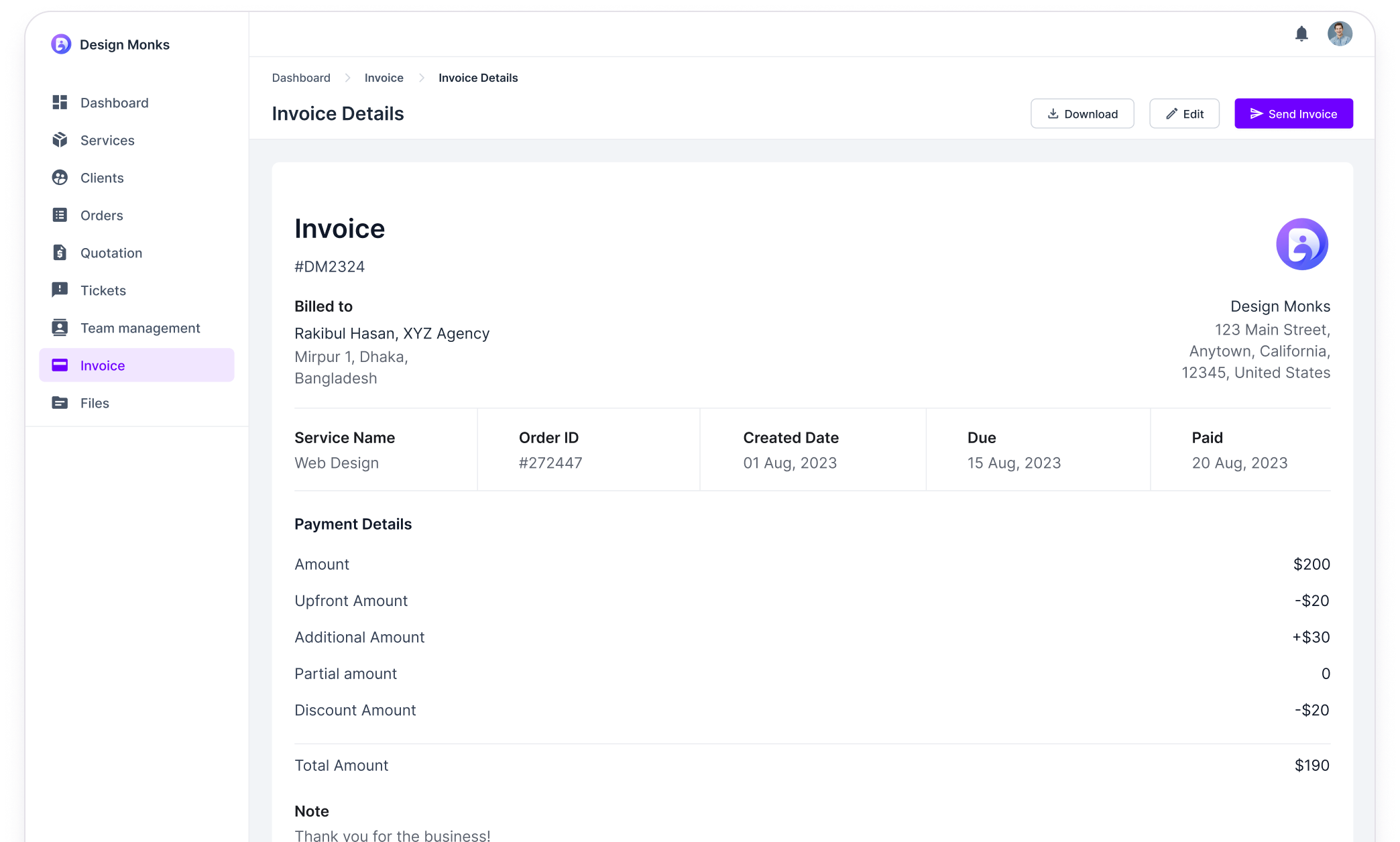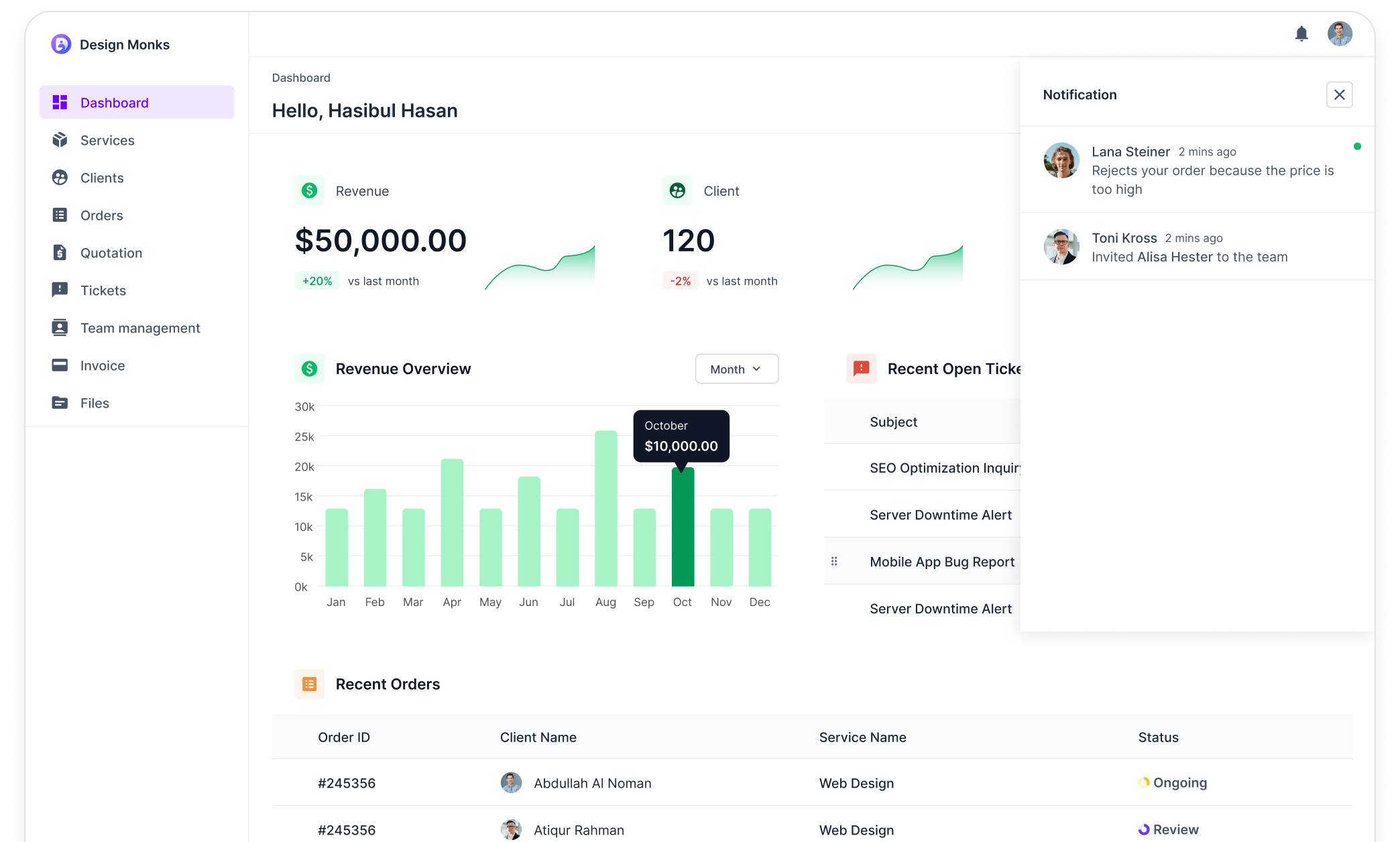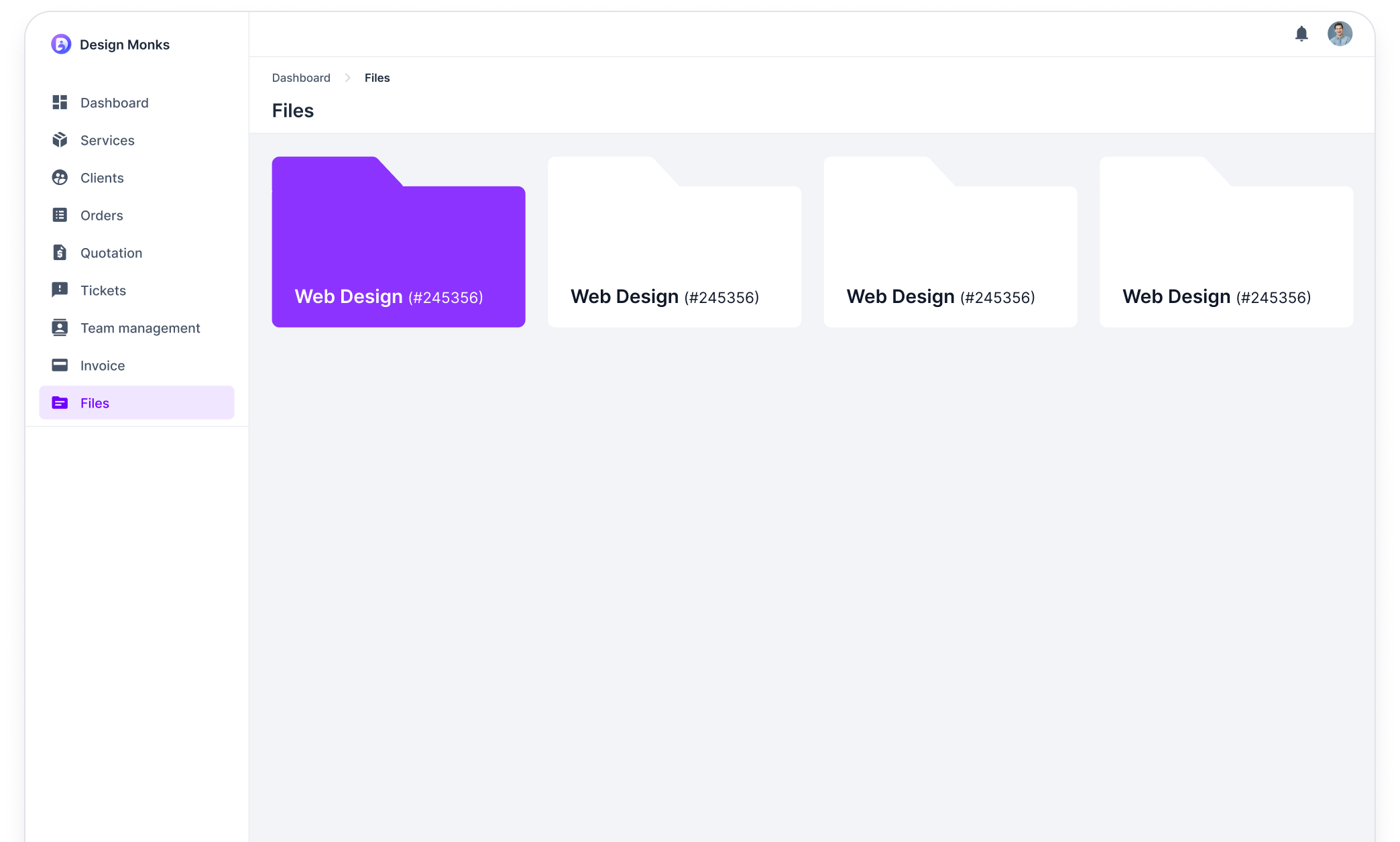
Agency Handy VS HoneyBook
The Comprehensive, Client-Focused Platform for Digital Agencies
Agency Handy provides advanced customization, multi-workspace support, and seamless client onboarding. Unlike HoneyBook’s limited flexibility, it excels in managing client approvals, detailed task tracking, and service catalogs, making it perfect for agencies handling complex operations.


Agency Handy VS HoneyBook
Feature-by-Feature Comparison
Features
Agency Handy
HoneyBook
Centralized Dashboard
Group Service Catalog
Service Listing with Price Range
Client Form
Order Form
Kanban Boards
Client Account Management
In-Built Messaging
Client Approval & Feedback
Client Scheduling Tools
Ticketing System
Reporting
Custom Branding
Email Customization
Built-in E-Signature for Contracts
Quotations/Proposals
Multiple Workspace
Automated Workflows
Integrated Billing & Invoicing
Subscription Management
Payment Integrations
Stripe, PayPal, Wise, and Manual Banking
Credit Cards and Banks
Affiliate Program
Live Chat Support
Public Roadmap
“Powered by” Removal in All Packages
Only Premium
Built-in Multi-Language Support
Multiple Currency Support
Limited to USD and CAD
Free Trial
14 days
7 days
What Our Clients Say!

Why Should You Choose Agency Handy Over HoneyBook?

Optimize Your Workflow with Customized Order Forms
Unlike HoneyBook’s simple lead and contact form, Agency Handy lets you add custom fields to all important info about the order with a self-checkout method.
Create a detailed order form at your own requirement. From the get-go, you can design and pre-identify the workflow you want to execute. Get all the task details at the beginning, like what’s this about, what the client wants from you, when it’s the expected deadline, and all the related files in one form. And nothing to worry about payment. A client can self-checkout via PayPal, Stripe, Wise, and manual banking. A total control over your workflow.
Tap Into the Global Market with Advanced Customization
HoneyBook offers some customization options, but it falls short in areas like email customization and multi-language support.
Agency Handy takes customization a step further by enabling agencies to fully white-label their client portals and customize everything from branding to email templates. And go beyond borders with multi-language support built-in. Agency Handy makes it easier to cater to a global client base and lets you customize in their language.


Accelerate Operations with Simplified Payment Integrations
Agency Handy offers flexibility, integrates with multiple payment gateways, and offers multi-workspace support.
Agency Handy gives you more flexibility with integrations to multiple payment gateways, including Stripe, PayPal, Wise, and manual banking, along with multi-workspace support. HoneyBook, while suitable for smaller businesses, lacks the capacity to handle complex operations or multiple client accounts like Agency Handy. If you’re running a growing agency, Agency Handy offers the scalability and advanced tools that you need to keep everything running smoothly.
Showcase and Sell Your Services with Ease
Agency Handy is built for digital agencies, offering advanced service catalog features for flexible client engagement beyond basic listings.
Agency Handy’s Service Catalog lets you showcase all your services, whether individually or as a group, giving you full control over how they’re presented. Unlike HoneyBook, which lacks a service catalog feature, Agency Handy offers flexibility in displaying prices—whether listing them separately or keeping them hidden. Clients can browse your offerings, place direct orders, and even leave reviews, streamlining the entire process and making it easier for them to engage with your services.

Explore More Features of Agency Handy
Scalable Software Built for Agencies, By Agencies
Stop settling for mediocre software. Upgrade to Agency Handy and see your agency reach its full potential.
Modular Design
Every agency has unique workflows. Our modular design allows you to build the perfect platform for your specific needs, streamlining processes and boosting efficiency.
100% White Label
Agency Handy lets you remove all traces of our branding, allowing you to showcase your agency and present a professional, branded experience that fortifies your image.
Support & Feedback
We prioritize ongoing real-world agency-driven development. Share your feedback with our channels and community. Get quick support from our expert team for a seamless experience.
Pricing
Agency Handy
Paid Plan Starts at
$49/Month
- Users Up to 3
- Custom Domain
- Multi Package Service Catalog
- Service Embedding
- Custom Order & Intake Form
- Built-in Ticketing System
- Multiple Workspaces
- Email Customization
- Kanban Board
HoneyBook
Monthly Billing
$29/Month
- Users Up to 1
- Custom Domain
- Email Customization
- Multi Package Service Catalog
- Service Embedding
- Custom Order & Intake Form
- Built-in Ticketing System
- Multiple Workspaces
- Kanban Board
Frequently asked questions
Yes, we don’t nickel and dime you for every little feature. Here are more answers:
Which platform is better for managing multiple clients and teams, Agency Handy or HoneyBook?
Agency Handy is better suited for managing multiple clients and teams due to its multi-workspace support and comprehensive client management features. HoneyBook is more focused on providing a streamlined experience for freelancers and small businesses.
Can I customize client-facing materials like invoices and proposals on both platforms?
Yes, but to different extents. Agency Handy allows full customization of client-facing materials, including branded invoices, proposals, and order forms, with options for multi-language support. HoneyBook, while offering customization for branded invoices and proposals, is more limited in flexibility and does not offer the same level of customization as Agency Handy.
How do the pricing plans compare between Agency Handy and HoneyBook?
When looking at cost per user, Agency Handy charges approximately $10 per user, offering flexibility for growing teams. In contrast, HoneyBook costs around $21 per user, making it more affordable for smaller teams or freelancers, but with fewer customization options. Both offer tiered pricing depending on the number of users and features required.
Agency Handy vs HoneyBook: Which Platform is Best for Your Business?
Trying to choose between Agency Handy’s advanced features and HoneyBook’s user-friendly simplicity?
Both tools offer excellent solutions for managing client relationships, but here’s what you need to know:
- If you’re a freelancer or small business owner looking for ease of use with contracts, invoicing, and payments, HoneyBook might be the right fit for you.
- But, if your digital agency needs a complete client journey, group service catalog, subscription management, and multi-workspace setting, Agency Handy offers more flexibility and scalability.
Ready to pick the platform that will streamline your business? Let’s dive into the details to help you decide!
On the other hand, Moxie excels for freelancers and solopreneurs, offering affordable pricing, comprehensive time-tracking, expense management, and deep integrations with popular tools like Google Calendar and QuickBooks. Its freelancer-focused order management features and straightforward approach align well with their relatively simpler needs.
Still weighing your options? Dive into our comprehensive comparison.
Agency Handy vs HoneyBook: A Detailed Comparison
We’ll compare how Agency Handy and HoneyBook compare. In this detailed comparison, we’ll go through key aspects such as target users, platform availability, ease of use, task management, client management, billing and invoicing, and pricing plans.
Target Users
Agency Handy is perfect for digital agencies of all sizes that need everything centralized, from onboarding new clients to final payment. On the other hand, HoneyBook is better suited for freelancers and small businesses who want an easy-to-use client management system.
Focus Area | Agency Handy | HoneyBook |
Best Suited For | Digital agencies needing full centralization from onboarding to final payment | Freelancers and small service businesses |
Core Strength | Advanced client and order management | Simple workflow management |
Key Features |
|
|
Value Proposition | Centralized management from start to finish | Streamlined client interaction, from lead capture to payment |
If you’re running a digital agency, Agency Handy is your all-in-one solution. It helps you onboard new clients, track tasks and orders, and handle billing with more control and customization. It’s built for agencies that need a comprehensive platform.
On the other hand, HoneyBook is ideal for freelancers and small businesses. It simplifies client management with features like invoicing and contract management.
While it offers a user-friendly experience, it doesn’t provide the same level of customization or multi-language support that larger agencies might need.
Client Acquisition
Agency Handy shines in client acquisition by offering a centralized group service catalog, allowing agencies to display all their services in one place. In contrast, HoneyBook provides intuitive tools for simple client acquisition but lacks the comprehensive Service Catalog that Agency Handy provides.
Focus Area | Agency Handy | HoneyBook |
Multi Package Service Catalog | Centralized service listing for easy browsing | Not available |
Single Service Listing | Detailed listing for individual services | Simple service selection |
Website Embedding | Integrates catalog into the agency’s website | Not available |
Agency Handy makes it easy for agencies to list multiple services, with options for detailed descriptions, group or individual pricing, and seamless checkout.
 You can also control how prices are displayed—whether to show a price range, list them individually, or hide them entirely for specific clients. This helps clients browse and purchase services easily in one place.
You can also control how prices are displayed—whether to show a price range, list them individually, or hide them entirely for specific clients. This helps clients browse and purchase services easily in one place.
Once the clients are done with your services, they can leave reviews for future reference.

And you can also embed the service catalog directly into your website, giving potential clients smooth access to all services without leaving the site.
HoneyBook, while offering basic service listings, doesn’t provide the centralized catalog or website embedding options that make Agency Handy so versatile for managing multiple services.
Client Onboarding
Agency Handy offers customizable intake and order forms with multiple pricing options and a self-checkout feature, making it easy for clients to select services and complete transactions smoothly. In contrast, HoneyBook simplifies things with contact and lead forms that include pricing details but lack multiple pricing options or self-checkout.
Focus Area | Agency Handy | HoneyBook |
Order Form | Custom fields with self-checkout | Templated design with no self-checkout |
Intake Forms | Customizable with file uploads | Customizable discovery forms |
Proposals | Customizable quotes/proposals with e-signatures | Proposal templates with e-signatures, legal contracts |
With the order form, you can add custom fields based on your needs to get started. Client info, task details, required spreadsheet/files, you’ll get it all via the order form. Plus, there’s a chance to upsell your services too including add-ons.

And you can share terms and conditions and get signatures in the same order form. But HoneyBook doesn’t have anything sort of that.

Interestingly, in terms of intake or lead forms, Agency Handy has the upper hand too. Agency Handy’sintake forms are more, featuring customizable options and file upload capabilities. You can get all the necessary client details and files in the form to move forward with the discussion.
HoneyBook provides customizable contact forms that can function as intake forms, catering to businesses that need basic client information collection without the need for advanced features like file uploads.

When it comes to proposals, Agency Handy shines with its customizable quotes and proposals, allowing agencies to tailor their offers to each client’s needs. These proposals can include e-signatures, making the process of securing new business efficient and professional.

HoneyBook also offers proposal templates, complete with e-signatures and legally vetted contract options, making it a strong choice for businesses that prioritize professionalism and legal compliance in their client agreements.

Task Management
When it comes to order management, Agency Handy and HoneyBook offer distinct approaches tailored to their target users. Agency Handy is designed to handle complex order tracking with start and end dates, along with detailed task statuses.
HoneyBook, on the other hand, also provides order management but with a focus on simplicity. It allows for task creation and tracking but lacks the comprehensive order-tracking features seen in Agency Handy.
Focus Area | Agency Handy | HoneyBook |
Order Tracking | Detailed tracking with start/end dates, statuses | Basic task tracking |
Task Management | Task creation, assignments, and tracking with deadlines | Task creation and tracking |
Workflow Visualization | Kanban boards, list view | Task organization views |
Client Feedback & Approvals | Comprehensive client feedback and approval workflows | Simple task approval workflows |
Agency Handy is built to manage the entire order process, from the first client interaction to final delivery. It ensures every step is clear and organized. You can assign tasks with specific deadlines, making it easy to know what needs to be done and when.

HoneyBook, on the other hand, is better suited for managing individual tasks, making it ideal for freelancers or small business owners who want a simple, streamlined process without the need for in-depth tracking.
Both platforms offer workflow visualization, but Agency Handy goes further. With Kanban boards and list views, you can easily see the progress of each order. This visual setup helps teams quickly spot and resolve any bottlenecks.

While HoneyBook also has workflow visualization, it focuses more on organizing tasks than managing the full order lifecycle.
Both platforms include client approvals, allowing clients to stay involved throughout the process. Agency Handy integrates client feedback and approval workflows into the order management system, so clients can approve tasks or milestones right within the platform.
HoneyBook also provides approval features, but they are more centered on simple task approvals rather than overseeing the entire order lifecycle.
Client Management
When it comes to client management, Agency Handy and HoneyBook offer robust solutions designed to meet different needs. Agency Handy provides a dedicated client portal where clients can access project details, communicate with the team, and track progress in real-time.
Focus Area | Agency Handy | HoneyBook |
Client Portal | Dedicated client portal | Dedicated client portal |
Client Profiles | Detailed profiles with custom fields | Detailed profiles with histories and logs |
Communication | Email and in-built messaging | |
Ticketing | Built-in ticketing system | Not available |
Both Agency Handy and HoneyBook include a client portal that provides a simple, user-friendly space for client interactions and progress tracking. But Agency Handy is designed to make things easier for both clients and businesses.
You’ll get to see all client details in one place – client profile, recent orders, tickets, and invoices.

Similarly, you’ll get to do so with HoneyBook. Communication, payment, additional/special notes, and profile details.

When it comes to communication, both platforms prioritize keeping clients informed, but they handle it differently. Agency Handy offers built-in email and messaging and a ticketing system, making it easy to manage client interactions and track issues within the platform.

HoneyBook also supports smooth client communication but only in email, though it doesn’t have a ticketing system. Instead, it takes a more simplified approach, focusing on general communication without extra layers for issue tracking.
Billing & Invoicing
Agency Handy provides a full invoicing system with manual and automated records and integrations for Stripe, PayPal, Wise, and bank payments. In contrast, HoneyBook simplifies billing with invoicing, payment reminders, and online payments with cards and banks.

Focus Area | Agency Handy | HoneyBook |
Invoicing | Automated and customizable invoices | Create invoices, send reminders, accept payments |
Payment Gateways | Stripe, PayPal, Wise, and manual banking | Cards and banking |
Subscriptions | Automated subscriptions | Recurring subscription billing |
Expense Tracking | Not available | Basic expense tracking |
When it comes to subscription management, Agency Handy stands out with its powerful automation features.

It takes care of everything—from task distribution to invoicing and subscriptions—so you don’t have to worry about the details. HoneyBook also offers recurring subscription billing, but it doesn’t include the automated invoices that Agency Handy provides.
Expense tracking is another key difference between the two platforms. Agency Handy doesn’t offer built-in expense tracking, which means you may need additional accounting software.
On the other hand, HoneyBook includes basic expense tracking, making it easier for freelancers and small businesses to manage both their expenses and invoicing in one place. And you’ll get detailed reports and insights of monthly profits and losses.

For those with simpler financial needs, Agency Handy might feel like a more complete solution.
Customization & Branding
Agency Handy lets you fully customize your branding, from colors and logos to the sign-in portal and even your domain, giving your agency a unique and professional look. While HoneyBook offers basic branding tools, Agency Handy’s advanced options ensure a more personalized experience that reflects your agency’s identity.
Focus Area | Agency Handy | HoneyBook |
Branding | Logo, favicon, custom domains, email, and sign-in portal | Custom colors and logos |
Email Customization | Fully customizable, white-labeled emails | Customizable emails focused on brand consistency |
Multi-Language | Multi-language support | Not available |
Agency Handy is great for email customization, giving you fully customizable templates so you can tailor your messages to fit your needs. This adds a personal touch to how you communicate with clients.

HoneyBook lets you customize emails too, but it focuses more on maintaining a consistent look and feel instead of offering deep customization.

A key feature that sets Agency Handy apart is its support for multiple languages. This allows you to work with clients in their own languages, improving the overall experience. It’s ideal for agencies with a variety of clients or those working internationally.
HoneyBook doesn’t have multi-language support and keeps its platform centered on an English-only experience.
Integrations
Focus Area | Agency Handy | HoneyBook |
Multi-Workspace | Supports multiple workspaces | Single workspace model |
Integrations | Primarily payment gateways and Webhooks | Connects with QuickBooks, Zoom, Google Calendar, etc. |
Integration is something you should consider when choosing between these tools. Agency Handy supports multiple workspaces, making it perfect for agencies managing different business teams or wings.

In contrast, HoneyBook uses a single workspace model, which works better for freelancers and small businesses with simpler structures. While HoneyBook doesn’t offer multi-workspace support, it integrates well with tools like QuickBooks, Zoom, and Google Calendar.

Agency Handy’s integrations are more focused on payment gateways and Webhooks, which is enough for agencies that need smooth payment processing and basic automation.

However, it might not work as well for those who need a wider range of app connections. HoneyBook, with its variety of integrations, is a good option for those who want easy connections to different tools.
Pricing Plans
Both Agency Handy and HoneyBook offer multiple pricing plans to suit businesses of various sizes and needs. Let’s take a closer look at the different plans and what they include:
Feature | Agency Handy | HoneyBook |
Entry-Level | $49/month (3 user) | $16/month (1 user) |
Mid-Tier | $99/month (Up to 10 users) | $32/month (Up to 2 users) |
High-End | $149/month (Up to 30 users) | $66/month (Unlimited users) |
Custom Pricing | Available | Not available |
Billing Model | Monthly or Yearly | Monthly or Yearly |
Agency Handy Pricing Plans:
Agency Handy’s pricing offers flexible solutions to fit your agency’s growth.

- Solopreneur:
- $69/month (billed monthly) or $49/month (billed annually)
- Up to 3 users
- Features include unlimited clients and orders, project management tools, service customization, client onboarding, and basic workflow management.
- Teams:
- $149/month (billed monthly) or $99/month (billed annually)
- For up to 10 users
- Includes all features from the Solopreneur plan, plus team collaboration tools, advanced task management, and enhanced client communication features.
- Pro:
- $199/month (billed monthly) or $149/month (billed annually)
- For up to 30 users
- Includes everything from the Teams plan, along with priority support, advanced reporting, and additional customization options for larger teams.
HoneyBook Pricing Plans:
HoneyBook’s pricing is designed for freelancers and small businesses
- Starter:
- $16/month (billed annually) or $19/month (billed monthly)
- Features include unlimited clients and projects, invoicing and payments, proposals and contracts, calendars, professional templates, client portals, basic reports, free setup, interactive documents, and support.
- Essentials:
- $32/month (billed annually) or $39/month (billed monthly)
- Includes everything in the Starter plan, plus: Scheduler, automation, QuickBooks Online integration, up to 2 team members, expense management, profit and loss reporting, and removal of “Powered by HoneyBook” branding.
- Premium:
- $66/month (billed annually) or $79/month (billed monthly)
- Includes everything in the Essentials plan, plus: Unlimited team members, priority support, multiple companies, onboarding specialists, and upcoming advanced reports.
Agency Handy vs HoneyBook: Which Tool to Choose for Your Business?
Now that you know how each tool differs and what they offer, it is time to ask the real questions. Which tool should you choose for your agency?
Worry not! In this section, we will help you make that decision.
Agency Handy is your pick if:
- You manage a digital agency with complex operations and multiple clients.
- You need a comprehensive service catalog and website embedding to showcase your offerings effectively.
- Streamlined client onboarding with custom order forms, intake forms, and proposals is crucial to your workflow.
- Automated subscription management and seamless recurring invoicing are important for your service-based model.
- Multi-workspace support is essential for managing different teams or clients efficiently within one platform.
- You value extensive customization options, including email branding, multi-language support, and custom pricing plans.
- Your agency is growing, and you need a platform that can scale with your increasing users and features.
Honeybook is your pick if:
- You are a freelancer, solopreneur, or run a small service-based business.
- An all-in-one platform to manage client workflows – from proposals to contracts to invoices – is what you need.
- Creating a professional, branded experience for your clients is a top priority.
- Keeping client interactions organized is key, and HoneyBook’s management tools fit your needs.
- You prefer a user-friendly, modern interface that’s easy to navigate.
- Automating tasks with AI tools to streamline your workload sounds appealing.
- Customization of client-facing materials, like proposals and invoices, is a priority.
Further Read: HoneyBook Alternative
Wrapping Up
In conclusion, both Agency Handy and HoneyBook offer robust features tailored to different business needs.
Agency Handy is ideal for digital agencies requiring full centralization, customization, and scalability. It’s a perfect fit for those who need comprehensive client and order management with advanced customization options.
On the other hand, HoneyBook shines for freelancers and small businesses seeking a user-friendly, all-in-one solution that simplifies client workflows.
Your choice depends on whether you need detailed control over every aspect of your operations or a streamlined, intuitive platform to manage client interactions efficiently.












